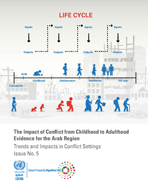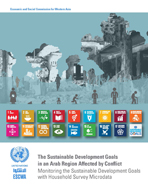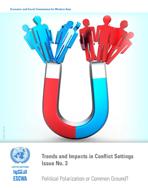Participatory Human Development in Post-Conflict Countries in the ESCWA region
Rationale:
Objective:
Targets / Stakeholders:
Partnerships:
Lessons Learned
Mainstreaming ICTs in development projects and plans, through the establishment of a full-fledged website and electronic forums, have proven to be a useful tool for advocacy, better information flows and communications, development of scalable solutions, and for knowledge and experience-sharing in a free way without constraints of physical location. Online conferencing is time and cost-effective, and providing incentives in such electronic initiatives (eg. Award-winning prize) to sensitize participants’ contribution bring the most weight to bear on the outcome of the discussions. The importance of investing in broad-based consultations with partners, securing political commitment and high-level buy-in, getting the analysis and diagnostics right and setting in place appropriate monitoring and follow-up mechanisms for the project diverse activities, have proven to be instrumental to ensure a healthy project management cycle. Cooperation with the League of Arab States has also proven to be essential to increase geographical impact, increased harmonization, thus leading to an increase in the project’s impact. It was also proven that engaging national coordinators in the preparation of the project-related stakeholder analysis is constructive to ensure timely implementation of country-based surveys and maximize their outcomes. Moreover, the engagement of previously trained end-users in the project capacity-building workshops shows an evident attempt of the project team to build institutional capacities and subsequently invest in selected qualified human resources to undertake similar programmes all over the Arab region.
Spurring end-users to replicate the project capacity-building programmes also proved to be successful as it further expanded the number of beneficiaries and increased ownership of the project outcomes in the targeted countries. Particular attention should be given when selecting partners in future projects, and detailed action plans should be set priory with selected partners based on concrete and realistic overarching and intersected areas of interests. Finally, it was concluded that encouraging targeted countries to move away from isolated sectoral interventions towards promoting an integrated and participatory social development approach is a long process that requires both time and extensive advocacy to show concrete results in the region, if not in the four targeted countries only.
Impact and outcomes
The impact of the project activities was highly significant at both substantive and technical levels. The implemented activities constituted a good opportunity to share knowledge and experience on participatory practices and post-conflict socio-political transition, as well as acquire skills in participatory-oriented project management, on training methodologies and participatory research approach to social development. It also frayed a way for a new democratic era in the Arab region through building consensus and networking among government bodies and civil society organizations entities on proper means for peaceful transition towards democracy. The six workshops and 3 electronic forums held during the project timeframe, ignited the inception of an ‘Arab Network on Participatory Social Development’ (NGO), aiming at universalizing ESCWA participatory approach in the region and sharing knowledge and experiences on effective participatory practices through capacity-building, inter-regional consultations and brainstorming activities. Another e-network (Arab Network for Social Development-ANSD/URL: http://groups.google.com/group/ansd ) was also initiated by end-users, which optimized networking among the project beneficiaries in terms of sharing post-workshops’ experiences and development initiatives, gauging support to participatory-based projects and building strong ties for follow-up actions. The workshops also induced the replication of ESCWA’s participatory-based programmes in Iraq, Palestine, Lebanon and Yemen, whereby technical and substantive servicing was presented by the project team to 22 replicated workshops, 2 lectures/seminars and 1 research strategic plan in the said countries, which were of benefit to a total of 723 end-users representing government bodies, local authorities, social workers, research centers and civil society institutions. This ascertains the multiplier effect of the project’s capacity-building programmes and their impact on national dialogue, strategies and development plans.










